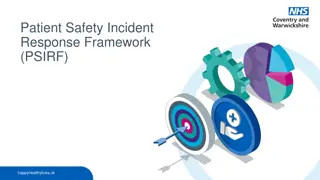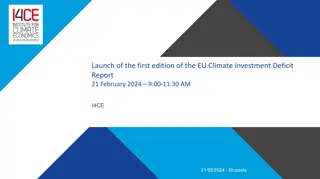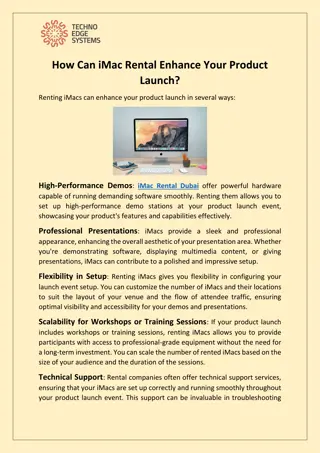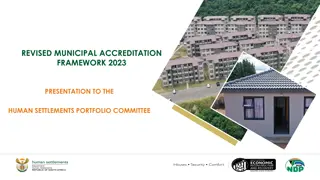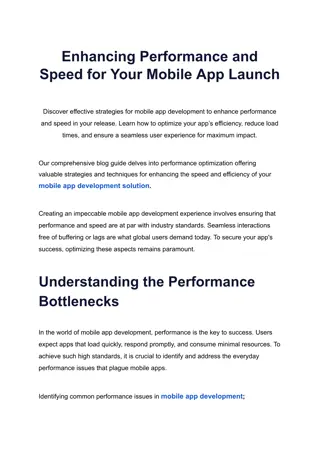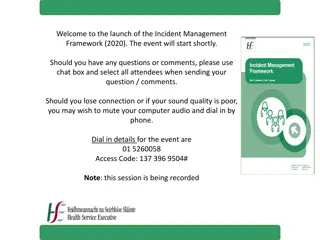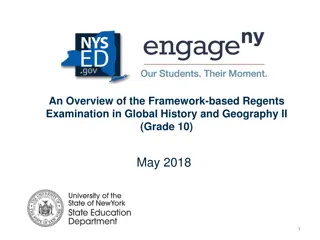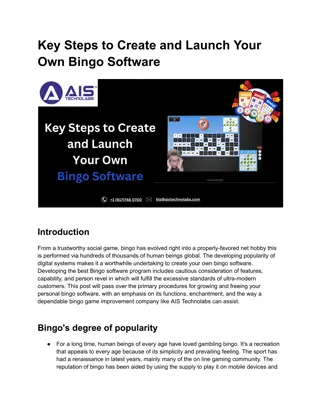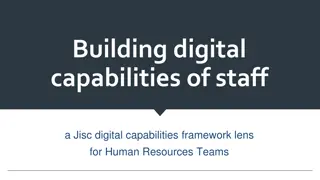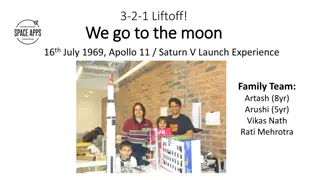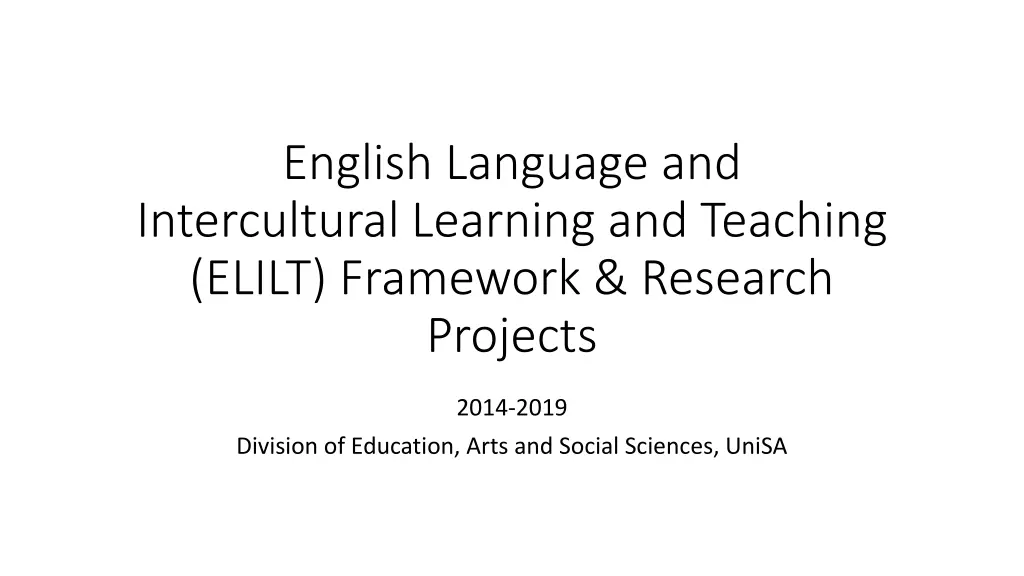
Innovative English Language and Intercultural Learning Research Projects 2014-2019
Explore the comprehensive English Language and Intercultural Learning and Teaching (ELILT) Framework and Research Projects undertaken from 2014 to 2019 at UniSA. The project encompasses phases of research, consultation, pilot studies, and student feedback on intercultural learning, knowledge exchange, academic English challenges, multilingual support, and more.
Download Presentation

Please find below an Image/Link to download the presentation.
The content on the website is provided AS IS for your information and personal use only. It may not be sold, licensed, or shared on other websites without obtaining consent from the author. If you encounter any issues during the download, it is possible that the publisher has removed the file from their server.
You are allowed to download the files provided on this website for personal or commercial use, subject to the condition that they are used lawfully. All files are the property of their respective owners.
The content on the website is provided AS IS for your information and personal use only. It may not be sold, licensed, or shared on other websites without obtaining consent from the author.
E N D
Presentation Transcript
English Language and Intercultural Learning and Teaching (ELILT) Framework & Research Projects 2014-2019 Division of Education, Arts and Social Sciences, UniSA
ELILT Framework: Phases of Research & Consultation Pilot English Language Project 2014 Phase 1 English Language & Intercultural Capabilities Learning Project: Two case studies: English Language & Intercultural Learning 2015 Research Two Reports, Div-EAS launch, November 2016 Phase 2 Consultations & drafting the English Language & Intercultural Learning & Teaching Framework 2017-2018 Follow-up study, focus group student interviews 2017: English language, Intercultural Learning, International Knowledge Exchange data indicated need for further research (83 students, AAD, CIL, EDS, PSW) Phase 3 English Language, Intercultural Learning & International Knowledge Exchange Study 2018-2019 Phase 4 Using Human Language Technology (Digital Learning Strategy, T&L ) 2019 Phase 5
Study 3: English Language, intercultural learning & knowledge exchange 2 stages of data collection Survey Interviews 95 students 4 schools of EASS: Education, AAD, PSW, CI International & domestic Undergraduate & postgraduate Internal & external 21 primary languages 7 students 3 schools of EASS: Education, AAD, PSW International & domestic Undergraduate & postgraduate Internal 5 primary languages
In brief Intercultural Learning Knowledge Exchange Languages Academic English Developing and using academic English can be challenging for students Multilingual students use their languages to support learning Students seek effective and meaningful intercultural learning Students place high value on (epistemic) knowledge exchange
What do students say? Intercultural Learning Students gave mixed and negative assessments of intercultural learning. Knowledge Exchange 93% of students believe international knowledge exchange benefits everyone. Languages Academic English 72% of multilingual students want academic materials in diverse languages 72% of students have experienced challenges with academic English. Materials to support: diverse perspectives understanding content understanding tasks & text types peer collaboration. Main challenges: academic writing terminology comprehending assignments speaking tasks. Students perceived IL: limited to specific courses course content and readings biased towards Anglo perspectives not in core content & assessments. Students seek: to learn from the diverse experiences of staff and peers. purposeful, planned knowledge exchange:
What needs does this imply? Think differently about language, culture & knowledge - in learning & teaching use of language in learning & teaching academic English is just one form of language amongst many international (epistemic) knowledge beyond the Western canon culture beyond notions of ethnicity, nationality, cuisine & customs all students & staff bring different resources knowledge exchange is multidirectional linguistic, cultural & faith-based diversity does not guarantee knowledge exchange Develop approaches for using diverse linguistic, cultural & knowledge resources in teaching for effective learning explicitly teach language demands in courses provide language support & resources acknowledge students language, culture & knowledge diversities incorporate purposeful & effective knowledge exchange encourage student & staff reflexivity
What should we do? See also ELILT framework, Section 4 & Appendix A Languages Academic English Audit academic English language demands of courses and assessments Explicitly teach academic language within courses Provide helpful feedback to students on English Promote EAL courses, learning support and online resources Provide staff training in multilingual and English language teaching approaches Intercultural Learning Knowledge Exchange Incorporate intercultural content into core curriculum and assessment Develop staff training in intercultural learning Support exchanges and intercultural experiences for students and staff Promote intercultural campus ecology and events Incorporate academic materials in a range of languages into course content and reading lists Promote opportunities for language learning Develop a diverse campus linguistic landscape (signage, print, art, design & soundscapes) Include bi-/multilingual inward and outward facing UniSA websites Address class size and composition to support knowledge exchange Develop staff training on grouping & facilitating exchange interactions Purposeful use of tutorial tasks & assessment to facilitate interaction & knowledge exchange Promote peer study groups & online forums Promote services to support student participation
Acknowledgements We wish to acknowledge our appreciation for the support within the Div-EAS between 2014 and 2019 to: Professor Joanne Cys Associate Professor Graham Hardy Professor Ruth Bridgstock Associate Professor Veronika Kelly The ELILT Reference and Working Groups 2015-2018 The Research Teams 2014-2016 Dr Kerrilee Lockyer 2017-2018 Dr Fiona O Neill and Dr Mei French 2018 Ms Cathy King Kathleen Heugh, Shashi Nallaya, Ruth Fazakerley 16 April 2019


